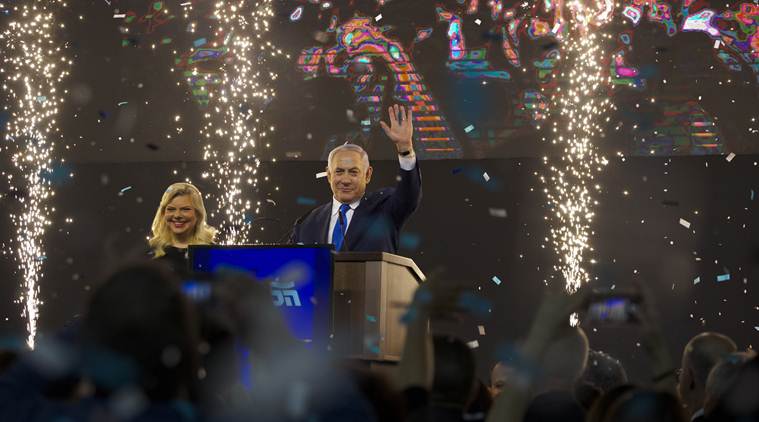April 9, 2019

Israel’s Prime Minister Benjamin Netanyahu accompanied by his wife Sara waves to his supporters after polls for Israel’s general elections closed in Tel Aviv, Israel, Wednesday, April 10, 2019. (AP Photo/Ariel Schalit)
Left-wing Israeli TV broadcasters had stars in their eyes last night at 10 when the initial election results came in. They told us breathlessly that former chief of staff Benny Gantz’s Blue and White Party—the challenger to Prime Minister Binyamin Netanyahu’s center-right coalition—had done phenomenally well and the elections and the leadership of the country were up for grabs.
But by Wednesday morning, with 97 percent of the votes counted, the same broadcasters had tired, glum faces. It turned out that Netanyahu—a providential leader who has done more than any other individual to turn 21st-century Israel into a phenomenal success story of economic growth and diplomatic and military weight on the world scene—had scored yet another dramatic win in his long, volatile, but essentially triumphant career.
True, Gantz’s Blue and White—a none-too-coherent assemblage of three smaller parties that included right-wingers, centrists, and left-wingers and tried the tack of vagueness and ambiguity in its election campaign—came through with 35 of the 120 seats in Israel’s Knesset (parliament). But Netanyahu’s Likud had tallied 35, too—up from 30 in the previous Knesset—and with the balance of the smaller parties clearly in the right's favor for a total of 65 seats, Netanyahu had come out decisively on top. And that’s despite corruption charges hanging over him and a predominantly hostile media.
Blue and White, moreover, could only reach its 35 votes by siphoning off mandates from two parties to its left, Labor and Meretz—which, according to the morning count, did miserably with 6 and 4 votes respectively. In the case of Labor—the historic party that led the country in its first decades under legendary figures like David Ben-Gurion, Golda Meir, and Moshe Dayan, and by the 1990s was engaging in a delusional “peace process” with the terrorist PLO—the depth of the defeat is unprecedented and resounding.
Another important point is that, if the right-wing bloc got 65 seats (and the total could still rise) to the left-wing bloc’s 55, even those figures are deceptive. As of the morning, 10 of the left’s 55 mandates came from two Arab parties. Those two parties, though—not because they’re Arab, but because they virulently oppose Israel’s existence as a Jewish state—are not relevant to any realistic calculation of Israeli coalitional strengths, and there was no chance that Gantz’s Blue and White would have included them in a coalition if it could have led one.
In other words, among the politically relevant voting public, the real results come out as another (like in the 2015 elections) landslide for the right. It’s made even more dramatic by the fact that Gantz, who called himself a “security hawk” and a “moderate capitalist,” tried to distance himself from the left and reassure Israelis that he was tough and realistic.
As for Netanyahu’s emergent coalition, two ultra-Orthodox Jewish parties, UTJ and Shas, had done well so far with 8 mandates each; the nationalist-Orthodox, strongly pro-settlement URWP had scored 5; and two secular-right parties, Israel Our Home and Kulanu, had 5 and 4 respectively. Still hanging in the balance was another pro-settlement, mixed religious-secular party, Naftali Bennett’s New Right—which, if it climbs to the required minimum of 4 seats, will make the governing coalition overwhelmingly big and stable.
What does it all mean? It means that the right-wing/religious sector of the Israeli Jewish population remains predominant and invincible. It means that the socialism of Israel’s early decades has been relegated to two none-too-relevant fringe parties. It means that with Gaza—fourteen years after Israel withdrew from it—remaining a serious security challenge of rocket fire, border riots, and incendiary balloons and kites, sane Israelis are not even contemplating withdrawals from the vastly larger West Bank that abuts Israel’s airport, capital city of Jerusalem, and heavily populated coastal plain.
And it means that a solid majority of Israelis appreciate Netanyahu’s strong and dynamic leadership and want to keep him at the helm—and that’s despite the unresolved corruption charges and an often viciously adversary media that is one of the last bastions of the old left. No doubt he faces significant challenges. A growing budget deficit needs to be tackled. Hamas and Hizballah remain security threats on Israel's borders. Most serious of all are their patron Iran's ongoing efforts to entrench itself in Syria and continued development of ballistic-missile and nuclear-weapons capabilities. But given his nonpareil energy, resolve, and skill, most Israelis know that Netanyahu is the right leader to contend with the challenges and overcome them.
Meanwhile, he faces a hearing on the corruption charges in the summer. The charges look dubious, and Israel has a long history of such allegations being quashed as the result of a hearing.
No comments:
Post a Comment